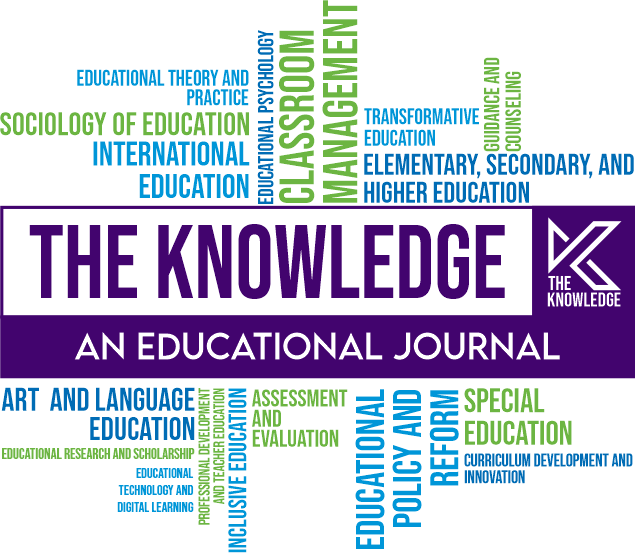The Role of Co-curricular Activities in the Development of Social Competencies of Students in Malaysia
DOI:
https://doi.org/10.63062/tk/2k23a.24209Keywords:
Social Skills, Co-curriculum Activities, Malaysia, ClassroomAbstract
This study examines how co-curricular activities affect children’s social skills. Give children social skills like communication and self-confidence. Extracurricular activities build interpersonal skills, preparing students for academic success and character development. Social skills are crucial for student interaction. By allowing students to connect with instructors and classmates outside of the classroom, extracurricular activities foster social skills. Extracurricular activities develop tangible, intangible, metaphysical, and intellectual character traits. The second phase of the Malaysian Education Blueprint (MEB) emphasizes human capital development. Students build human capital by connecting with their environment, making friends, and learning outside of the classroom through leisure activities. It will also foster knowledge, innovation, and student growth. The purpose of this concept paper is to examine how extracurricular activities affect students' social skills and academic success. Extracurricular activities must be respected in Malaysian education
References
Adil, D. M. A. M., ABDULLAH, A. B., & Mansor, W. N. W. (2020, December 1). Human capital and the legacy of Tun Abdullah Ahmad Badawi | New Straits Times. NST Online. https://www.nst.com.my/opinion/columnists/2020/12/645885/human-capital-and-legacy-tun-abdullah-ahmad-badawi
Ahmad, R. H. (1998). Educational development and reformation in Malaysia: past, present and future. Journal of Educational Administration, 36(5), 462–475. https://doi.org/10.1108/09578239810238456
Bartkus, K. R., Nemelka, B., Nemelka, M., & Gardner, P. (2012). Clarifying The Meaning Of Extracurricular Activity: A Literature Review Of Definitions. American Journal of Business Education (AJBE), 5(6), 693–704. https://doi.org/10.19030/ajbe.v5i6.7391
Buckley, P., & Lee, P. (2018). The impact of extra-curricular activity on the student experience. Active Learning in Higher Education, 22(1), 37–48. https://doi.org/10.1177/1469787418808988
Cuff, B., Brown, S. J., Taylor, L., & Howat, D. (2016). Empathy: A review of the concept. Emotion Review, 8(2), 144–153. https://doi.org/10.1177/1754073914558466
Danielsen, A. G., Samdal, O., Hetland, J., & Wold, B. (2009). School-Related Social Support and Students’ Perceived Life Satisfaction. The Journal of Educational Research, 102(4), 303–320. https://doi.org/10.3200/joer.102.4.303-320
Keser, F., Akar, H., & Yildirim, A. (2011). The role of extracurricular activities in active citizenship education. Journal of Curriculum Studies, 43(6), 809–837. https://doi.org/10.1080/00220272.2011.591433
Mercer, J., Barker, B., & Bird, R. (2010). Human resource management in education: Contexts, themes, and impact. Routledge.
Morgan, A. (2021, August 4). The Importance of Interpersonal Skills in the Workplace. One Education. https://www.oneeducation.org.uk/importance-of-interpersonal-skills-in-the-workplace/
Nevenglosky, E., Cale, C., & Aguilar, S. P. (2019). Barriers to effective curriculum implementation. Research in Higher Education Journal, 36. http://files.eric.ed.gov/fulltext/EJ1203958.pdf
Omae, N. S. (2017). IMPLICATIONS OF CO-CURRICULAR ACTIVITIES ON QUALITY EDUCATION IN PUBLIC SECONDARY SCHOOLS IN KENYA. Advances in Social Sciences Research Journal, 4(1). https://doi.org/10.14738/assrj.41.2554
Sarah, R., Rye, J., Selmer, S., & Luna, M. (2017). Action Research to Integrate Science with Mathematics through Garden-Based Learning at the Elementary School Level. Journal of Advances in Education Research, 2(4). https://doi.org/10.22606/jaer.2017.24001
Sarah, R., Rye, J., Selmer, S., & Luna, M. (2017). Action Research to Integrate Science with Mathematics through Garden-Based Learning at the Elementary School Level. Journal of Advances in Education Research, 2(4). https://doi.org/10.22606/jaer.2017.24001
Sarkar, D. (2022, August 27). Importance of Co-Curricular Activities for Students. IDreamCareer. https://idreamcareer.com/blog/cocurricular-activities-for-students/
Scott, W. (2009). Judging the Effectiveness of a Sustainable School. Journal of Education for Sustainable Development, 3(1), 33–39. https://doi.org/10.1177/097340820900300110
Shamsudin, S., Ismail, S. F., Al-Mamun, A., & Nordin, S. K. B. S. (2014). Examining the Effect of Extracurricular Activities on Academic Achievements among the Public University Students in Malaysia. Asian Social Science, 10(9). https://doi.org/10.5539/ass.v10n9p171
Stouten, J., Rousseau, D. M., & De Cremer, D. (2018). Successful Organizational Change: Integrating the Management Practice and Scholarly Literature. Academy of Management Annals, 12(2), 752–788. https://doi.org/10.5465/annals.2016.0095
Yusof, R. (2021). Holistic Leadership: The Islamic Characteristic of Malaysian Gifted Learners in Pusat Genius. Turkish Journal of Computer and Mathematics Education (TURCOMAT), 12(3), 2713–2722. https://doi.org/10.17762/turcomat.v12i3.1301
Published
Issue
Section
License
Copyright (c) 2025 Copyright in the THE KNOWLEDGE is retained by the author(s). Authors also grant any third party the right to use the article freely as long as its integrity is maintained and its original authors, citation details and publisher are identified.
This work is licensed under a Creative Commons Attribution-NonCommercial 4.0 International License.







